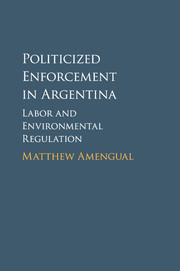Book contents
- Politicized Enforcement in Argentina
- Politicized Enforcement in Argentina
- Copyright page
- Contents
- Acknowledgments
- 1 Introduction
- 2 Explaining enforcement of labor and environmental regulations
- Part I Labor regulation
- Part II Environmental regulation
- Part III Conclusion
- Appendix List of Interviews in Argentina
- Works Cited
- Index
- References
Works Cited
Published online by Cambridge University Press: 05 January 2016
- Politicized Enforcement in Argentina
- Politicized Enforcement in Argentina
- Copyright page
- Contents
- Acknowledgments
- 1 Introduction
- 2 Explaining enforcement of labor and environmental regulations
- Part I Labor regulation
- Part II Environmental regulation
- Part III Conclusion
- Appendix List of Interviews in Argentina
- Works Cited
- Index
- References
- Type
- Chapter
- Information
- Politicized Enforcement in ArgentinaLabor and Environmental Regulation, pp. 251 - 266Publisher: Cambridge University PressPrint publication year: 2016



